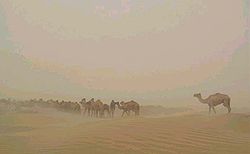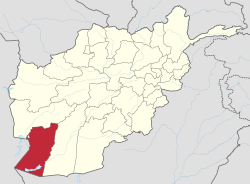Nimroz Province
|
Nimruz Pashto: نيمروز ولايت Persian: ولایت نیمروز |
|
|---|---|

Chakhansur in Nimruz Province
|
|
 Map of Afghanistan with Nimruz highlighted |
|
| Coordinates (Capital): 31°00′N 62°30′E / 31.0°N 62.5°ECoordinates: 31°00′N 62°30′E / 31.0°N 62.5°E | |
| Country |
|
| Capital | Zaranj |
| Government | |
| • Governor | Muhammad Samiullah |
| Area | |
| • Total | 41,356 km2 (15,968 sq mi) |
| Population (2012) | |
| • Total | 156,600 |
| • Density | 3.8/km2 (9.8/sq mi) |
| Time zone | UTC+4:30 |
| ISO 3166 code | AF-NIM |
| Main languages |
Pashto Balochi Dari |
Nimruz (Balochi/Persian: ولایت نیمروز; Pashto: نيمروز ولايت) is one of the 34 provinces of Afghanistan, located in the southwestern part of the country. It lays to the east of the Sistan and Baluchestan Province of Iran and north of Balochistan, Pakistan. The province contains five districts, encompassing about 649 villages, and roughly 156,600 settled people. The city of Zaranj serves as the provincial capital and Zaranj Airport, which is located by that city, serves as a domestic airport for the province.
The name Nimruz means "mid-day" or "half-day" in Persian and Pashto. The name is believed to indicate that the meridian cutting the old world in half passes through this region. Nimruz covers 41,000 km². It is the most sparsely populated province in the country, located in the Sistan Basin. A substantial part of the province is the desert area of Dashti Margo.
The area now composing Nimruz province of Afghanistan was once part of the historical region of Sistan, which over the many centuries was held by the Achaemenid Empire, Alexander the Great and others before being conquered and converted to Islam by the Muslim Arabs in the 7th century. The region became part of the Saffarid dynasty in 860 CE with its capital at Zaranj, which was one of the first local dynasties of the Islamic era. Its founder Yaqub Saffari was born and raised in this region. The territory became part of the Ghaznavids followed by the Ghurids, Timurids, and Safavids.
...
Wikipedia
